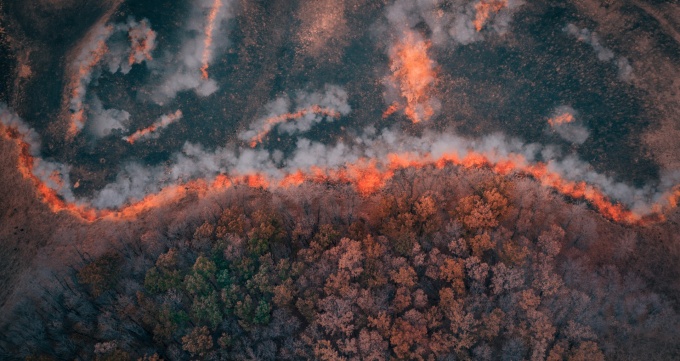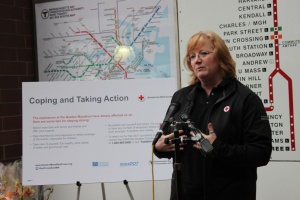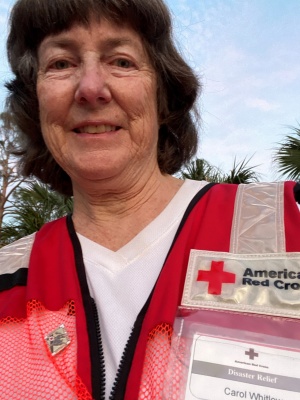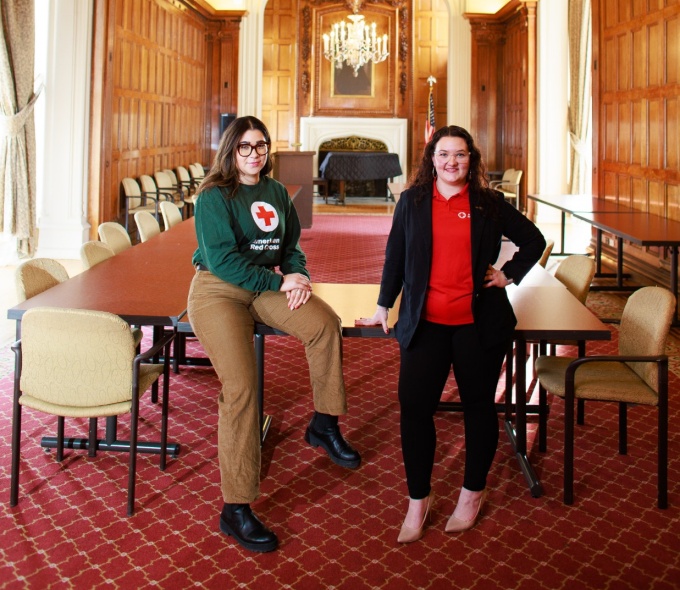When disaster strikes
How School of Social Work alumni and faculty help families and communities rebuild

By Matthew Biddle
Tara Hughes, LCSW-R, has met countless people on the worst day of their lives.

Tara Hughes speaks to media about how neighbors can take care of their mental health after the Boston Marathon bombing of 2013. Photo: Jay Bonafede, American Red Cross.
Since 2002, she has responded to house fires, mass casualty events and natural disasters across the country as a disaster relief volunteer for the American Red Cross.
For example, in 2007, she was deployed to Enterprise, Alabama, where a tornado ripped through a high school and killed eight students. Hughes trained staff on psychological first aid so they could help students through the trauma and be ready for school at an alternative site.
“If you can immediately provide psychological first aid for people, their long-term mental health needs go down drastically. If I put a Band-Aid on a cut, I won’t get infected — that’s the same way you think about this,” explains Hughes, a longtime School of Social Work adjunct instructor, who created the Red Cross’ local internship program and supervised many UB MSW students before relocating to Maine.
Over the years, Hughes has advanced from volunteering as a disaster mental health responder to managing disaster mental health teams — to leading as the assistant director for operations at a disaster site, charged with “overseeing everything that touches people, from feeding and housing to spiritual care, disability integration, nurses and disaster mental health.” For instance, after Hurricane Laura in 2020, she ran efforts to provide temporary housing, food, case management and mental health services for 46,000 displaced people in two states, while addressing public health concerns amid the COVID-19 pandemic.
— Tara Hughes, UB School of Social Work adjunct instructor and director of National Training and Technical Assistance Center within the U.S. Department of Justice’s Bureau of Justice Assistance
Hughes is also a recognized subject matter expert on mass casualty response, both for the Red Cross and in her full-time role as director of the National Training and Technical Assistance Center within the U.S. Department of Justice’s Bureau of Justice Assistance. In both roles, she has coordinated high-level response programs and supported communities facing unthinkable tragedies — like the Boston Marathon, Pulse nightclub and Pittsburgh synagogue shootings — through the immediate aftermath and their long-term needs.
Across all disasters, Hughes says most people’s reaction to extreme stress is predictable, and easing that stress can significantly reduce the number of people who will develop post-traumatic stress disorder (PTSD), anxiety, depression or other issues in the weeks to come.
“When we experience something big and unexpected, we often react in ways we don’t understand. Maybe you don’t sleep, crave sugar or ask big questions, like ‘Why did God let this happen?’” Hughes says. “You feel like you’re broken, and it’s hard to take functional actions — move into a temporary apartment, put your kids to bed — when your brain tells you that you’re broken.”
She continues: “Through disaster mental health, I can say, ‘All of that is predictable,’ and 99% of the time, the relief on the person’s face in front of me is astronomical. The fact that I can provide relief for someone who’s just had the worst day of their life will always keep me coming back to this work.”
A long process
The American Red Cross is mandated by Congress to provide disaster relief services. Through its Disaster Cycle Services team, the Red Cross helps people prepare for, respond to and recover from every kind of disaster, from single-family house fires to earthquakes, blizzards, wildfires and beyond.
Volunteers make up more than 90% of the Red Cross workforce — and, because of the climate crisis, their work is more critical than ever. In 2024 alone, there were 27 disaster events exceeding $1 billion in losses in the United States, just missing the record of 28 set the previous year, according to the National Oceanic and Atmospheric Administration. Globally, climate-related disasters have doubled in the last 20 years, and the most vulnerable will suffer disproportionately from the increasing frequency and intensity of these hazards, according to the United Nations.
Carol Whitlow, LCSW, MSW ’06, is one such volunteer who has deployed with the Red Cross to 25 disasters over the past 25 years. In 2006, her first deployment found her only 100 miles from home in Ithaca, New York, helping a rural community recover from a major flood. Since then, Whitlow has provided mental health support and resources after floods in Texas and wildfires in Colorado, and she was on hand when the 9/11 Memorial & Museum opened in New York to support the victims’ families and first responders.

Carol Whitlow gets ready to help during one of her 25 Red Cross deployments.
In Oklahoma, Whitlow traveled with a nurse and damage assessor to provide counseling for families in rural communities affected by a series of tornadoes. One family she met had been living in a mobile home while constructing a new house on their property, but that house had been destroyed by the storm.
“He said, ‘I’m not sure I want to build again,’” Whitlow recalls. “It not only took away his property but also his ability to see positive in the future. People don’t just bounce back immediately. They have to reattach themselves little by little to their life and their community.”
Most recently, she spent four weeks in Lahaina, Hawaii, in November 2023 and January 2024, following the 2023 wildfires. While helping to staff a multiservice center, Whitlow provided on-site mental health support and child care.
“Even after months, people were still reeling from the immensity of the loss,” she says. “People have lasting trauma from those experiences and may have flashbulb memories or triggers. A woman told me she couldn’t watch a sunset because the colors reminded her of the fire. It’s a long recovery process for people.”
Showing up
Back in Buffalo, Julianna Stella, MSW ’19, serves as senior disaster program manager, overseeing both volunteers and paid staff for disaster services across the Red Cross’ 27-county Western New York region. Stella joined the organization as one of Hughes’ MSW interns, came on full time after graduation in 2019 and has since received several promotions.
“We’re the largest humanitarian organization in the world,” Stella explains. “The hope is that our recovery team can work with the family to get them as close to their pre-disaster situation as possible.”
To do so, Stella says the organization takes a holistic approach, working with clients to implement a recovery plan that covers their financial, emotional, physical, mental and spiritual needs. The Red Cross Disaster Action Team (DAT) will arrive on scene shortly after the first responders to help address the victims’ immediate needs and begin the client intake process.
Locally, Stella’s team most often responds to house fires, followed by snowstorms and flooding. She also vividly recalls the racist Tops massacre of 2022, when her team was on site for weeks connecting neighbors with services, serving meals and working with local agencies and officials to guide the community’s long-term recovery.

From left, Liz Hall and Julianna Stella at the Red Cross’s Western New York Chapter headquarters. Photo: Stephen Gabris.
“The community really came together during the tragedy,” Stella says. “That resiliency doesn’t take away what happened, but you see there are good people in the world. As long as there are good people doing this work, it can’t be all bad.”
Stella shared that sentiment recently with her MSW interns. As a School of Social Work field educator, she has supervised several MSW students since 2020, including Liz Hall, MSW ’25, who completed her foundation year placement with the Red Cross and stayed on for a second placement this year.
During her first year, Hall responded to local disasters with the DAT, managed a caseload of families through their recovery and provided CPR training at local schools and community centers. As an advanced year student, she’s taken on additional responsibilities with her caseload, including coordinating with community and government agencies for clients, and used her marketing skills to create infographics on preparedness skills.
Across both years, Hall also collaborated on a “legacy project” with Clinical Assistant Professor Tonya Myles-Day, working to adapt a diversity, equity and inclusion training that Myles-Day developed and deliver it for all local Red Cross staff and volunteers.
“Working here has definitely challenged me to step out of my comfort zone,” says Hall, explaining how disaster response requires quick thinking and immediate solutions. “I’ve learned to use my voice more and gained a deeper understanding of myself and how I want to show up in different environments.”
Like Stella, Hall says that while their work can be stressful, even devastating at times, the ability to support families through their worst moments makes it all worthwhile.
“That’s what really drew me in to this job — I wanted to be able to make a difference in people’s lives every day,” Hall says. “Things can happen in a snap, but we’re the ones who get to show up and help.”
— Julianna Stella, MSW ’19, senior disaster program manager, WNY Red Cross